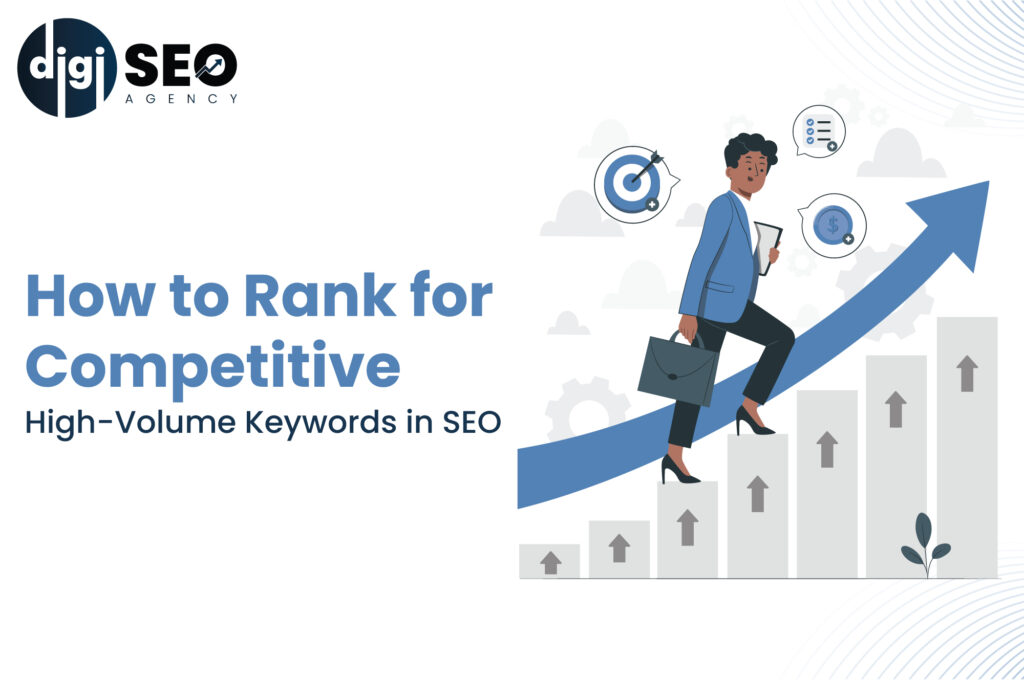Ranking for competitive and high volume keywords is a common goal for many businesses looking to grow their online presence. However, it’s not as simple as picking a popular term and hoping for the best. SEO is a continuous effort that requires strategy, content planning, and an understanding of what makes content valuable to both search engines and users.
In this blog, we’ll explore how to successfully rank for these highly competitive keywords and the key practices that will improve your chances of landing at the top of search results.
Start with the Right Keywords
Choosing the right keywords is the first and most important step in your SEO strategy. High volume, competitive keywords are often difficult to rank for, but that doesn’t mean it’s impossible. To target these keywords effectively, start by doing thorough keyword research.
Using tools like Google Keyword Planner, SEMrush, or Ahrefs, you can identify keywords that have a significant search volume while still being relevant to your business. A local business in Ahmedabad, for example, might want to focus on keywords such as “SEO Company in Ahmedabad” if they want to target people in their specific area.
When you perform keyword research, look for a balance of search volume and competition. High volume keywords might have a lot of competition, but they also offer high potential for traffic if you can rank for them.
Create Content That Answers User Intent
Once you’ve identified your target keywords, it’s essential to create content that addresses the user intent behind those keywords. What are people searching for when they type in these terms? Are they looking for answers to a specific question, or are they looking to make a purchase or decision?
When crafting your content, be sure to answer these questions clearly and concisely. Providing value to your audience will help you stand out from the competition.
For instance, if you’re targeting a keyword like “SEO services in Ahmedabad,” your content should offer detailed information about SEO services available in the area, how businesses can benefit from them, and what makes a good SEO company in Ahmedabad. Avoid generic, fluffy content, and instead focus on offering in depth insights that are helpful and relevant.
Optimize On Page SEO
To improve your chances of ranking for competitive keywords, on page SEO is critical. This includes optimizing several aspects of your website content, such as:
- Title Tags and Meta Descriptions: Incorporating your target keyword naturally in these areas helps search engines understand the focus of your page.
- Headings (H1, H2, etc.): Break your content into digestible sections using headers. This not only helps users navigate your content easily but also helps search engines categorize it better.
- URL Structure: Keep your URLs short and relevant, ideally including your main keyword.
- Internal Linking: Linking to other relevant pages or blog posts on your website helps Google crawl your content more effectively and distributes SEO authority across your site.
By focusing on these on page factors, you can boost your visibility in search engine results, even when targeting competitive keywords.
Read Also, The Pros and Cons of Using AI for SEO: A Comprehensive Look
Build High Quality Backlinks
Backlinks play a significant role in SEO. The more reputable websites that link to your content, the more authority Google will assign to your page. For competitive, high volume keywords, building high quality backlinks is one of the most effective ways to improve your rankings.
However, focus on the quality of backlinks, not quantity. Aim to get backlinks from authoritative, industry specific websites that are relevant to your niche. You can achieve this by:
- Guest posting on reputable blogs in your industry.
- Partnering with influencers or thought leaders who can reference your content.
- Creating shareable content that naturally attracts backlinks.
A strong backlink profile signals to Google that your content is credible and valuable, which can significantly improve your ranking for competitive keywords.
Ensure Your Content is Mobile Friendly
Mobile optimization is more important than ever. With more people searching on their phones than ever before, search engines like Google now prioritize mobile friendly websites in their rankings. If your site isn’t optimized for mobile, you could be losing out on valuable traffic, even if you have great content and good SEO.
Ensure that your website is responsive, meaning it adjusts to different screen sizes. Your content should be easy to read on mobile devices, with a clear layout, fast load times, and no intrusive pop ups.
Focus on Local SEO (If Applicable)
If you’re a local business or service provider, local SEO should be a key focus in your strategy. For example, if you run an SEO company in Ahmedabad, targeting local keywords can help attract clients who are looking for SEO services in your area.
To improve your local SEO:
- Claim and optimize your Google My Business listing.
- Include location based keywords throughout your content (e.g., “SEO services in Ahmedabad”).
- Encourage satisfied clients to leave reviews on Google and other local review platforms.
- Build local citations by getting your business listed in online directories that focus on your geographic area.
Focusing on local SEO helps you connect with customers who are ready to make a purchase or hire a service provider like you.
Monitor and Adjust Your Strategy Regularly
SEO is not a set it and forget it process. To maintain your ranking for competitive, high volume keywords, you need to regularly monitor your performance and make adjustments as necessary. Keep track of key metrics such as:
- Organic Traffic: Is your traffic increasing as expected?
- Keyword Rankings: Are you climbing the ranks for your target keywords?
- Bounce Rate and Time on Page: Are visitors staying on your site or leaving quickly?
Using tools like Google Analytics and Google Search Console can provide you with valuable insights into how your content is performing and where there may be room for improvement. Regularly updating and improving your content, as well as revisiting your keyword strategy, can help you stay ahead of the competition.
Read Also, Top Challenges in Ranking for Competitive Keywords
Conclusion
Ranking for competitive, high volume keywords isn’t easy, but it is achievable with the right strategy. By choosing the right keywords, creating valuable content, optimizing your site, building backlinks, and focusing on mobile and local SEO, you can significantly improve your chances of ranking at the top.
As an SEO company in Ahmedabad, staying on top of the latest SEO trends and adapting your strategy is essential to success. Keep refining your approach, monitoring results, and adjusting as necessary to stay ahead of the competition.




